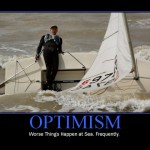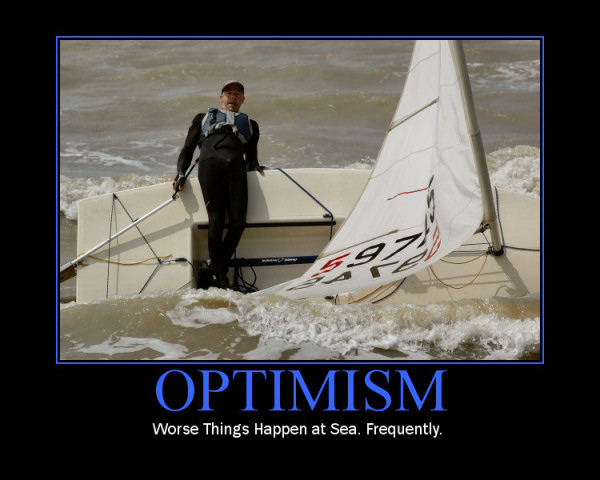 Optimists trust that the future will be mostly good – they also believe their decisions, choices and actions shape their destinies. There is evidence to suggest that optimists tend to have better coping mechanisms and tend to be less negatively impacted but life’s little ups and downs. They recover faster, tend to eat right and exercise, are less likely to smoke, suffer less from aches and pains and are at a much lower risk for dementia and other diseases.
Optimists trust that the future will be mostly good – they also believe their decisions, choices and actions shape their destinies. There is evidence to suggest that optimists tend to have better coping mechanisms and tend to be less negatively impacted but life’s little ups and downs. They recover faster, tend to eat right and exercise, are less likely to smoke, suffer less from aches and pains and are at a much lower risk for dementia and other diseases.
But what if you’re not a natural born optimist? Studies seem to indicate that optimism is only slightly influenced by genetics – 20% at best. In fact your experiences, the language you use to describe them and the meanings that you have attributed to them shape your world and your future outlook. Every single one of us can learn to become optimistic. However optimism is not achieved by making a decision one day to be optimistic – it takes more than attempting to change your feelings or outlook consciously.
Particularly in this time of economic uncertainty, faith and optimism are powerful belief structures. Arguably however, both are habits and need to be developed and nurtured over time. In fact 99% of what we do is pure habit – the domain of the subconscious.
Positive thinking alone is inherently undependable. Sustained optimism requires more than The Secret, The Law of Attraction and a few positive affirmations. Optimism is not something you are born with – it is a learned behaviour/habit. The same is true of pessimism. When the going gets tough, affirmations fly out the door and the subconscious habits will kick back in and cause all of us to sabotage our own success. In actual fact, each of us is our own worst enemy.
At the end of the day, it is not what happens to you that matters. It is about who you are and what you become because of (not despite) what happens. Change your perspective today…change your life forever!
07 Feb 2012
Are You A Natural Born Optimist?
First let’s get one thing straight – happiness and optimism are not the same thing. Happiness is an emotion, a feeling, a state of mind that can be changed in an instant. Optimism is something quite different – it is a belief about the future.
Optimists trust that the future will be mostly good – they also believe their decisions, choices and actions shape their destinies. There is evidence to suggest that optimists tend to have better coping mechanisms and tend to be less negatively impacted but life’s little ups and downs. They recover faster, tend to eat right and exercise, are less likely to smoke, suffer less from aches and pains and are at a much lower risk for dementia and other diseases.
But what if you’re not a natural born optimist? Studies seem to indicate that optimism is only slightly influenced by genetics – 20% at best. In fact your experiences, the language you use to describe them and the meanings that you have attributed to them shape your world and your future outlook. Every single one of us can learn to become optimistic. However optimism is not achieved by making a decision one day to be optimistic – it takes more than attempting to change your feelings or outlook consciously.
Particularly in this time of economic uncertainty, faith and optimism are powerful belief structures. Arguably however, both are habits and need to be developed and nurtured over time. In fact 99% of what we do is pure habit – the domain of the subconscious.
Positive thinking alone is inherently undependable. Sustained optimism requires more than The Secret, The Law of Attraction and a few positive affirmations. Optimism is not something you are born with – it is a learned behaviour/habit. The same is true of pessimism. When the going gets tough, affirmations fly out the door and the subconscious habits will kick back in and cause all of us to sabotage our own success. In actual fact, each of us is our own worst enemy.
At the end of the day, it is not what happens to you that matters. It is about who you are and what you become because of, not despite, what happens. Change your perspective today…change your life forever!
Article Source: http://EzineArticles.com/2919330
08 Dec 2011
Is Your Optimism Holding You Back?
 “The pessimist complains about the wind; the optimist expects it to change; the realist adjusts the sails.” William Arthur Ward
“The pessimist complains about the wind; the optimist expects it to change; the realist adjusts the sails.” William Arthur Ward
I was reminded of this brilliant principle last week when I spoke to one of my business coaching clients. There can be no doubt that we are living in interesting times…. the global financial crisis has impacted overall spending and consumer sentiment – and this has hurt many small businesses around the country. It’s no good hoping that circumstances will change – in order to survive we all need to dig deep and find creative ways to work smarter not harder.
Jim Collins, in his book, “Good to Great,” talks about this very interesting paradox that he calls “The Stockdale Principle”. According to Collins, “you have to be realistic about your current situation and yet, stay optimistic about the future”.
General Stockdale was the highest ranking American prisoner of war in Hanoi, Vietnam. Over the years he began to notice an interesting phenomenon – optimism could in fact be a liability. His fellow prisoners (who were the eternal optimists) constantly set themselves up for disappointment. They set huge milestones – “we will be rescued by Christmas” – but those milestones came and went year after year and with it… their will to live.
Conversely, the prisoners who looked at the painful day-to-day reality they were in and channeled their energies to the right places survived. This is not to say that the second group were pessimists but rather realists that maintained an unwavering faith in the end game, and a commitment to survive despite the brutal fact of their incarceration and torture over a period of years.
Here’s how Stockdale put it in his own words: “I never lost faith in the end of the story. I never doubted not only that I would get out, but also that I would prevail in the end and turn the experience into the defining event of my life, which, in retrospect, I would not trade.”
How many of us would look back on seven years of detention – with regular torture, dismal living conditions and an uncertain future – as an experience we would not trade? Do you regard the greatest obstacles or challenges in your life as the defining moment that shaped who you are today or do you choose to look at them as an excuse or reason why you have not achieved more?
Have you ever sat back and thought how this distinction between optimism versus reality could apply to your business/career or your life in general? Where in your life are you ignoring reality in favour of being optimistic and missing a crucial opportunity to take action?
Take for example my business coaching client that I mentioned above. She has an employee who doesn’t take responsibility for her actions, doesn’t pay attention to details and is often defensive and reluctant to take direction and feedback. This employee is negatively impacting the entire work environment as everyone gets caught up in the drama of it all. My client doesn’t want to let the employee go and is resisting doing what she knows that she must. She hopes that it will somehow improve without any action on her part – she is now learning the distinction between reality and optimism. When she sees the difference for what it is, then and only then, will she become decisive and take action.
Another area where it’s easy to be blinded by optimism is in the financial arena. Do you have detailed financial reports, KPIs and cashflow forecasts in place to drive your decision making or are you simply relying on your optimism instead of reality? Failure to effectively plan in this area (especially in these tough times) could lead to a cash crunch and the demise of your business.
Take a moment today to examine your relationship to optimism, pessimism and realism. Success belongs to those who operate from both sides of the Stockdale Paradox. The key is balance – knowing when to accept reality and take appropriate action AND never losing faith in the end of the story. If you can walk this delicate line of balance and responsibility, you increase your odds of making good decisions and this will lead to your inevitable success and breakthrough results.
In life, we will all experience setbacks, disappointments, loss and challenges. What separates successful people from the rest is how you deal with those inevitable struggles. This is a very important distinction and it is what divides the winners from the losers. You must never confuse faith that you will prevail in the end – which is something that you can never afford to lose sight of – with the discipline to confront the brutal facts and reality of your current situation, whatever that might be.
Article Source: http://EzineArticles.com/2884021
14 Aug 2011
What if Optimism is Killing Your Business?
“The pessimist complains about the wind; the optimist expects it to change; the realist adjusts the sails.” William Arthur Ward
I was reminded of this brilliant principle last week when I spoke to one of my business coaching clients. There can be no doubt that we are living in interesting times…. the global financial crisis has impacted overall spending and consumer sentiment – and this has hurt many small businesses around the country. It’s no good hoping that circumstances will change – in order to survive we all need to dig deep and find creative ways to work smarter not harder.
Jim Collins, in his book, “Good to Great,” talks about this very interesting paradox that he calls “The Stockdale Principle”. According to Collins, “you have to be realistic about your current situation and yet, stay optimistic about the future”.
General Stockdale was the highest ranking American prisoner of war in Hanoi, Vietnam. Over the years he began to notice an interesting phenomenon – optimism could in fact be a liability. His fellow prisoners (who were the eternal optimists) constantly set themselves up for disappointment. They set huge milestones – “we will be rescued by Christmas” – but those milestones came and went year after year and with it… their will to live.
Conversely, the prisoners who looked at the painful day-to-day reality they were in and channeled their energies to the right places survived. This is not to say that the second group were pessimists but rather realists that maintained an unwavering faith in the end game, and a commitment to survive despite the brutal fact of their incarceration and torture over a period of years.
Here’s how Stockdale put it in his own words:
“I never lost faith in the end of the story. I never doubted not only that I would get out, but also that I would prevail in the end and turn the experience into the defining event of my life, which, in retrospect, I would not trade.”
How many of us would look back on seven years of detention – with regular torture, dismal living conditions and an uncertain future – as an experience we would not trade? Do you regard the greatest obstacles or challenges in your life as the defining moment that shaped who you are today or do you choose to look at them as an excuse or reason why you have not achieved more?
Have you ever sat back and thought how this distinction between optimism versus reality could apply to your business/career or your life in general? Where in your life are you ignoring reality in favour of being optimistic and missing a crucial opportunity to take action?
Take for example my business coaching client that I mentioned above. She has an employee who doesn’t take responsibility for her actions, doesn’t pay attention to details and is often defensive and reluctant to take direction and feedback. This employee is negatively impacting the entire work environment as everyone gets caught up in the drama of it all. My client doesn’t want to let the employee go and is resisting doing what she knows that she must. She hopes that it will somehow improve without any action on her part – she is now learning the distinction between reality and optimism. When she sees the difference for what it is, then and only then, will she become decisive and take action.
Another area where it’s easy to be blinded by optimism is in the financial arena. Do you have detailed financial reports, KPIs and cashflow forecasts in place to drive your decision making or are you simply relying on your optimism instead of reality? Failure to effectively plan in this area (especially in these tough times) could lead to a cash crunch and the demise of your business.
Take a moment today to examine your relationship to optimism, pessimism and realism. Success belongs to those who operate from both sides of the Stockdale Paradox. The key is balance – knowing when to accept reality and take appropriate action AND never losing faith in the end of the story. If you can walk this delicate line of balance and responsibility, you increase your odds of making good decisions and this will lead to your inevitable success and breakthrough results.
In life, we will all experience setbacks, disappointments, loss and challenges. What separates successful people from the rest is how you deal with those inevitable struggles. This is a very important distinction and it is what divides the winners from the losers. You must never confuse faith that you will prevail in the end – which is something that you can never afford to lose sight of – with the discipline to confront the brutal facts and reality of your current situation, whatever that might be.
Article Source: http://EzineArticles.com/2884021
Many different factors have the potential to cause stress in a person’s life. If you take a look around you will see that some people have learned to manage and control their levels of stress much better than others. Even though there is no 1 specific key or “secret” to managing stress, the answer lies in learning to balance of a combination of little things and your physiology.
High levels of stress can lead to various medical conditions, negatively impact your daily routine and impair your ability learn and recall. The hormones which the brain releases in stressful situations are meant for fight or flight situations only – over use of these can actually be detrimental to the health of your brain and body.
Work (whether you own your own business or not) is filled with challenges, obstacles and opportunities that have the potential to cause stress. Knowing how this impacts you physically is the first step leading you to new insights and understandings on how to manage and control your reactions in an empowering way.
Your body language is a powerful indication of your ability to handle stress and problems. When your body encounters a stressful situation, hormones are automatically released into your adrenal glands to counterbalance the cortisol in your brain. Equilibrium is established when these stimulating and tranquilizing forces become equal. When one is greater than the other, you will experience a sense of imbalance, commonly referred to as stress.
In fact, your body goes to great lengths to prevent you from experiencing imbalance or stress. Your sympathetic nervous system and parasympathetic nervous system essentially battle each other to bring your body back to equilibrium. This fight or flight response to stress also necessitates the shutting down of many of the other key systems in the body – which makes it much more difficult to reason, react and communicate while in this agitated state.
It is next to impossible to eliminate stress completely from your life. Some stress is actually good for us. However, learning how to quickly and reliably relieve stress and become focused will enable you to tackle challenges with a clear head, communicate clearly and navigate tense situations. In fact, the best way to reduce stress quickly and reliably is through managing the sensory input received by the body: through sight, sound, smell, taste, and touch. Each person responds differently to various levels and types of sensory input – the trick is to find out what works best for you.
We all have different preferences, tolerances and needs. For example, certain kinds of music or distinctive smells may relax one person but irritate another. Take the time to discover what works best for you at home, in your car, at the office, or wherever you may encounter stress. Simple deep breathing and relaxation techniques also work wonders and they are free, easy to implement and produce quick results.
Harnessing the power of sensory stress-busting techniques will provide you with a powerful technique for staying calm, collected and in control. You’ll have the assurance to face adversity and challenge in every aspect of your life, knowing that you have the ability to bring your body back into a state of equilibrium and ease.
Article Source: http://EzineArticles.com/2646119










